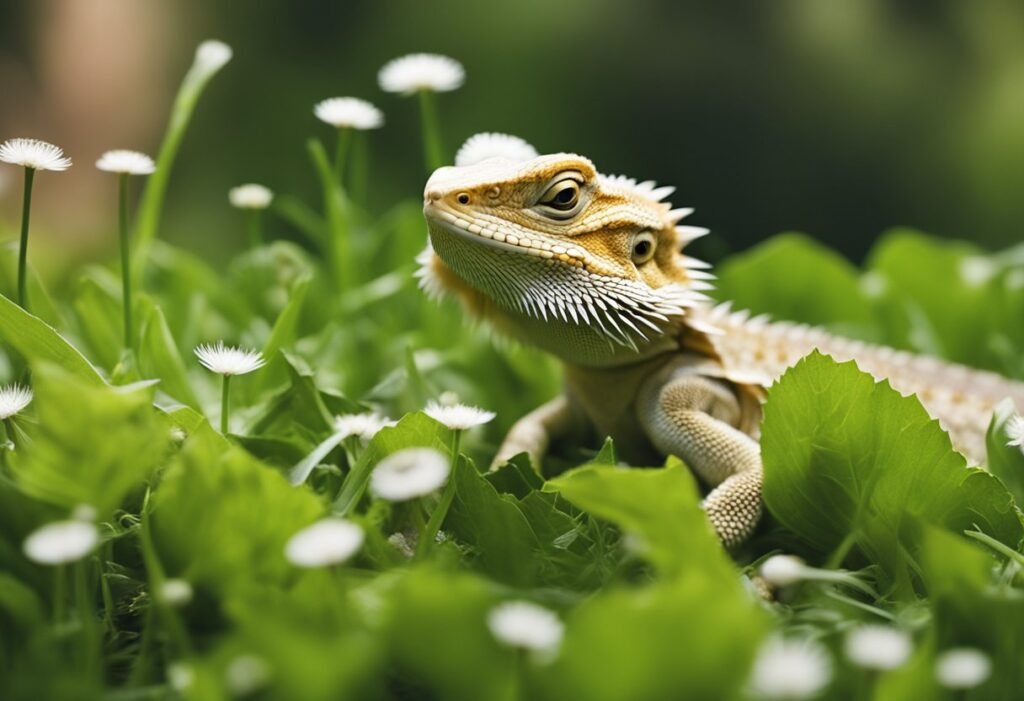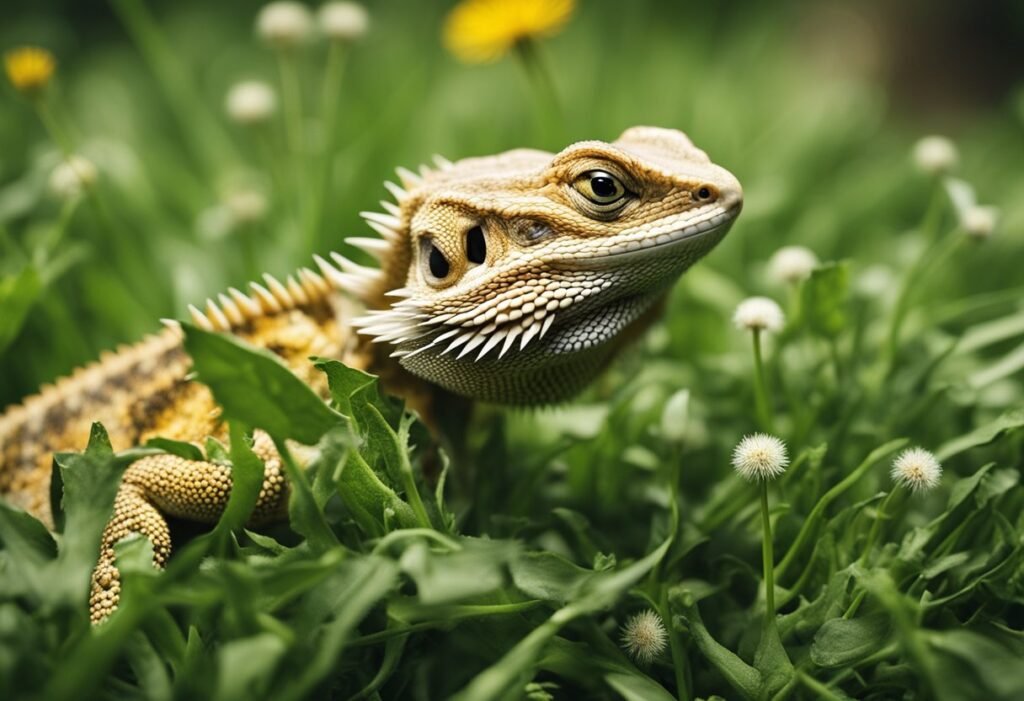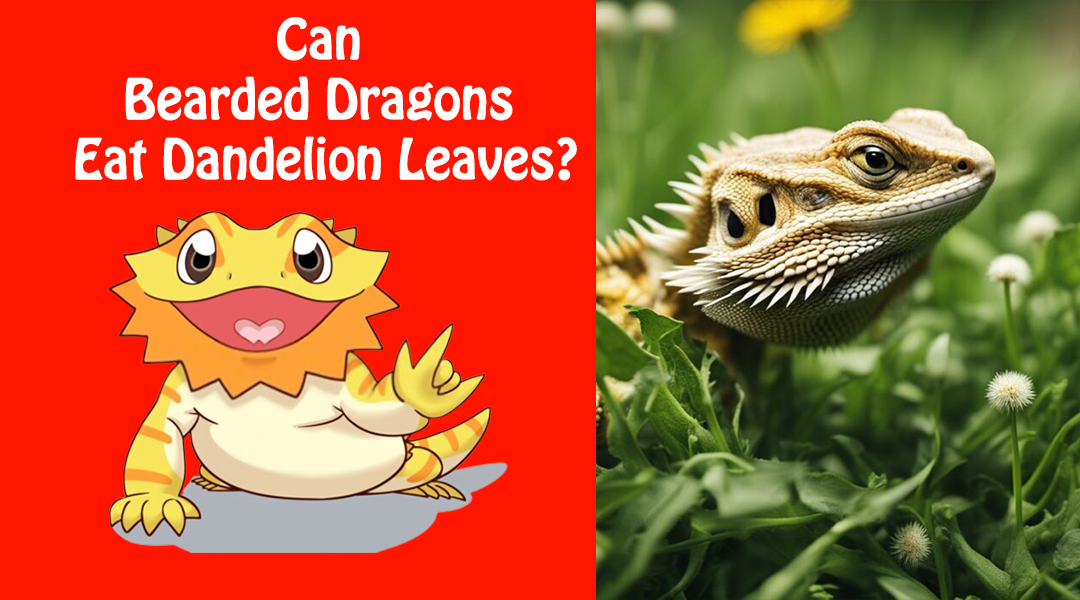Bearded dragons are one of the most popular reptile pets due to their docile nature and ease of care. As a responsible pet owner, it is important to provide them with a balanced diet that meets their nutritional needs. While commercial diets and live insects are a staple in their diet, many owners wonder if they can supplement their bearded dragon’s diet with other types of greens, such as dandelion leaves.
Dandelion leaves are a common weed found in many backyards and gardens. They are also a popular choice for feeding herbivorous reptiles, such as bearded dragons. Dandelion leaves are a good source of fiber, calcium, and other essential vitamins and minerals. However, it is important to know if they are safe for bearded dragons to eat and how much should be given to them. In this article, we will explore whether bearded dragons can eat dandelion leaves and the potential benefits and risks associated with feeding them this type of green.
Understanding Bearded Dragons’ Diet

Bearded dragons are omnivorous, which means they eat both plant and animal matter. In the wild, their diet consists of insects, small rodents, and vegetation. However, in captivity, they are commonly fed a diet of insects and vegetables.
It is important to provide a varied diet for your bearded dragon to ensure that they receive all the necessary nutrients. A diet that is too limited can lead to health problems such as metabolic bone disease.
When it comes to vegetables, dandelion leaves can be a nutritious addition to your bearded dragon’s diet. They are high in calcium and vitamin A, which are important for bone health and vision, respectively.
However, it is important to note that not all plants are safe for bearded dragons to eat. Some plants can be toxic and cause serious health problems. It is important to do your research and ensure that any plants you feed your bearded dragon are safe for them to eat.
In addition to dandelion leaves, other safe vegetables for bearded dragons include collard greens, mustard greens, and squash. It is also important to provide a variety of insects such as crickets, mealworms, and dubia roaches to ensure that your bearded dragon receives a balanced diet.
Overall, understanding your bearded dragon’s diet and providing a varied and nutritious diet is essential for their health and well-being.
Dandelion Leaves: Nutritional Content

Dandelion leaves are a common food item for bearded dragons. They are a great source of nutrients and vitamins that are essential for the health of your pet. In this section, we will discuss the nutritional content of dandelion leaves and how they can benefit your bearded dragon.
Dandelion leaves are a rich source of calcium, which is essential for the growth and maintenance of strong bones in bearded dragons. They also contain a significant amount of Vitamin A, which is important for maintaining healthy skin and eyesight. In addition, dandelion leaves are a good source of Vitamin C, which helps to boost the immune system and prevent illness.
One of the benefits of feeding your bearded dragon dandelion leaves is that they are low in oxalates. Oxalates can bind to calcium in the body and prevent it from being absorbed, which can lead to calcium deficiencies. Dandelion leaves have a low oxalate content, which means that the calcium in the leaves is more readily available for your bearded dragon to absorb.
Dandelion leaves are also high in fiber, which helps to promote healthy digestion in bearded dragons. The fiber in the leaves can help to prevent constipation and other digestive issues.
Overall, dandelion leaves are a nutritious and healthy food item for bearded dragons. They are a great source of calcium, Vitamin A, and Vitamin C, and are low in oxalates. Feeding your bearded dragon a diet that includes dandelion leaves can help to promote good health and prevent illness.
Impact of Dandelion Leaves on Bearded Dragons’ Health
Dandelion leaves are a common vegetable fed to bearded dragons. They are rich in vitamins and minerals, making them a nutritious addition to a bearded dragon’s diet. However, it is important to understand the impact that dandelion leaves can have on a bearded dragon’s health.
One potential issue with feeding dandelion leaves to bearded dragons is that they contain high levels of oxalates. Oxalates can bind to calcium in the body, leading to the formation of calcium oxalate crystals. This can be problematic for bearded dragons, as they require high levels of calcium for proper bone development and overall health.
To mitigate the risk of calcium oxalate crystal formation, it is important to balance the amount of dandelion leaves in a bearded dragon’s diet with other calcium-rich foods, such as calcium powder or calcium-rich vegetables like collard greens.
Another factor to consider is the source of the dandelion leaves. If they are picked from an area that has been sprayed with pesticides or herbicides, they may contain harmful chemicals that can be detrimental to a bearded dragon’s health. It is important to only feed bearded dragons dandelion leaves that have been grown organically or in an area that has not been treated with chemicals.
Overall, dandelion leaves can be a nutritious addition to a bearded dragon’s diet when fed in moderation and sourced from a safe and organic location. However, it is important to be aware of the potential risks and take steps to mitigate them.
How to Feed Dandelion Leaves to Bearded Dragons

Feeding dandelion leaves to bearded dragons is a great way to provide them with a variety of nutrients. However, it’s important to do it right to avoid any health issues. Here are some tips on how to feed dandelion leaves to your bearded dragon:
1. Choose Fresh and Organic Dandelion Leaves
It’s important to choose fresh and organic dandelion leaves for your bearded dragon. Avoid using leaves that have been sprayed with pesticides or herbicides. You can find fresh dandelion leaves in your local grocery store or farmer’s market.
2. Wash the Leaves Thoroughly
Before feeding the dandelion leaves to your bearded dragon, make sure to wash them thoroughly. Rinse the leaves under running water to remove any dirt or debris.
3. Chop the Leaves into Small Pieces
Bearded dragons have small mouths, so it’s important to chop the dandelion leaves into small pieces. This will make it easier for them to eat and digest.
4. Feed in Moderation
While dandelion leaves are a great source of nutrition for bearded dragons, they should be fed in moderation. Too much of any food can cause health problems. We recommend feeding dandelion leaves as a treat once or twice a week.
5. Monitor Your Bearded Dragon’s Health
After feeding dandelion leaves to your bearded dragon, monitor their health. If you notice any unusual behavior or symptoms, such as lethargy or diarrhea, stop feeding them dandelion leaves and consult a veterinarian.
By following these tips, you can safely feed dandelion leaves to your bearded dragon and provide them with a nutritious treat.
Possible Risks and Precautions
When feeding dandelion leaves to bearded dragons, there are a few risks and precautions to keep in mind.
Firstly, it is important to ensure that the dandelion leaves have not been treated with pesticides or other chemicals. These can be harmful to your bearded dragon and may cause illness or even death. Therefore, it is recommended to only feed dandelion leaves that have been grown organically or purchased from a trusted source.
Additionally, while dandelion leaves are generally safe for bearded dragons to eat, they do contain high levels of oxalates. Oxalates can bind with calcium in the body, potentially leading to calcium deficiency and metabolic bone disease. As such, it is important to feed dandelion leaves in moderation and alongside other calcium-rich foods.
Another potential risk when feeding dandelion leaves is the presence of thorns or other sharp objects. These can cause injury to your bearded dragon’s mouth or digestive tract. Therefore, it is important to thoroughly wash and inspect the leaves before feeding them to your pet.
Overall, while dandelion leaves can be a nutritious addition to your bearded dragon’s diet, it is important to take precautions to ensure their safety and wellbeing. By sourcing organic leaves, feeding in moderation, and inspecting for potential hazards, you can help keep your bearded dragon healthy and happy.
Alternatives to Dandelion Leaves for Bearded Dragons
While dandelion leaves are a great source of nutrition for bearded dragons, there are other options that can be included in their diet. Here are some alternatives to dandelion leaves that you can consider:
Collard Greens
Collard greens are a great source of Vitamin A, C, and K. They are also a good source of calcium, which is essential for the growth and development of bearded dragons. You can feed collard greens to your bearded dragon raw or cooked. Be sure to wash them thoroughly before feeding them to your pet.
Mustard Greens
Mustard greens are another excellent source of nutrition for bearded dragons. They are high in Vitamin A, C, and K, and are also a good source of calcium. You can feed mustard greens to your bearded dragon raw or cooked. Be sure to wash them thoroughly before feeding them to your pet.
Turnip Greens
Turnip greens are a great source of calcium, Vitamin A, and K. They are also high in fiber, which helps with digestion. You can feed turnip greens to your bearded dragon raw or cooked. Be sure to wash them thoroughly before feeding them to your pet.
Kale
Kale is a great source of nutrition for bearded dragons. It is high in Vitamin A, C, and K, and is also a good source of calcium. You can feed kale to your bearded dragon raw or cooked. Be sure to wash it thoroughly before feeding it to your pet.
In conclusion, there are many alternatives to dandelion leaves that can be included in the diet of bearded dragons. It’s important to provide a variety of greens to ensure that your pet is receiving all the necessary nutrients.
Conclusion

In conclusion, while dandelion leaves can be a nutritious addition to a bearded dragon’s diet, they should not be relied upon as a sole source of nutrition. It is important to ensure that a bearded dragon’s diet is varied and balanced, consisting of a mix of greens, vegetables, fruits, and insects.
Dandelion leaves can be a good source of calcium, fiber, and vitamins A and C. However, they should be fed in moderation, as too many can lead to digestive issues and diarrhea. It is also important to ensure that the dandelion leaves are free of pesticides and other harmful chemicals.
Overall, dandelion leaves can be a healthy and tasty treat for bearded dragons, but they should not make up a significant portion of their diet. As with any food, it is important to introduce dandelion leaves gradually and monitor your bearded dragon’s health and digestion.
Frequently Asked Questions
Are dandelion leaves safe for bearded dragons to eat?
Yes, dandelion leaves are safe for bearded dragons to eat. In fact, they are a great source of nutrition for your pet. Dandelion leaves are high in calcium, iron, and vitamin A, which are all important for the health of your bearded dragon.
Can baby bearded dragons eat dandelion leaves?
Yes, baby bearded dragons can eat dandelion leaves. However, it is important to make sure that the leaves are chopped up into small pieces to make them easier for your baby bearded dragon to eat and digest.
What other flowers can bearded dragons safely eat?
Bearded dragons can safely eat a variety of flowers, including hibiscus, nasturtium, and rose petals. However, it is important to make sure that the flowers are pesticide-free and have not been treated with any chemicals.
Is it okay for bearded dragons to eat catsear?
Yes, bearded dragons can eat catsear. Catsear is a type of dandelion that is safe for bearded dragons to eat. It is high in fiber and other nutrients that are important for the health of your pet.
Are grass and clover safe for bearded dragons to eat?
Yes, grass and clover are safe for bearded dragons to eat. However, it is important to make sure that the grass and clover have not been treated with any chemicals or pesticides.
Can bearded dragons consume daisies or buttercups?
No, bearded dragons should not eat daisies or buttercups. These plants are toxic to bearded dragons and can cause serious health problems if ingested. It is important to make sure that your bearded dragon does not have access to these plants.
I, Mark Antonelli am highly interested in pet care tips. The experiences I gained through university life in animal sciences were also helpful to identify the best tricks for caring for and feeding varying kinds of pets. I know the majority of people love to own a pet. Yet, there is a guilty of owing a Bearded Dragon due to a lack of information about how much friendly and peaceful they are. I thought of filling this gap with detailed writings about this Pogona genus Bearded Dragon. All my team is also giving me great support to fulfil my mission. Hope you will enjoy the journey with us.

